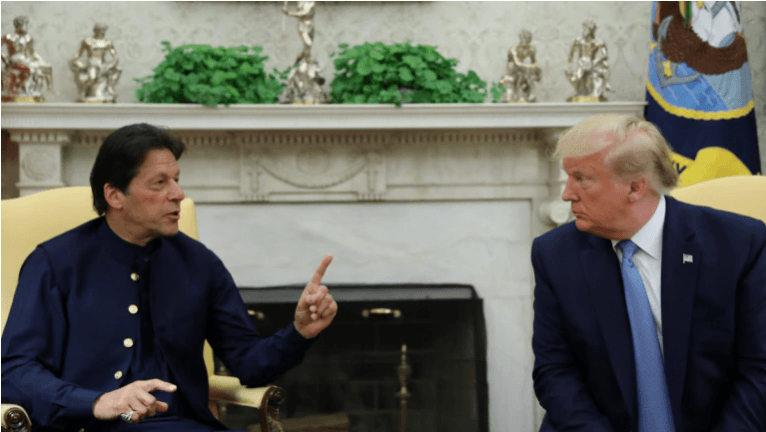
Pakistan's ambivalent response to try and elicit an international opposition against India's revocation of Jammu and Kashmir's special status underscores the country's near-total isolation.
Islamabad is left with few options as even its most staunch allies have reportedly been lukewarm to its cries for international outrage. Hobbled by an ailing economy, Islamabad finds itself checkmated by the trio of Prime Minister Narendra Modi, Home Minister Amit Shah and National Security Adviser (NSA) Ajit Doval.
No wonder the responses from the United Nations, US, and the UK, apart from Saudi Arabia, and the UAE were understandably disappointing for Pakistan, which expected a full-throated condemnation for India's move.
The helplessness of Pakistani Prime Minister Imran Khan before Prime Minister Modi's shock therapy was evident when he threw up his hands saying, "What do you what me to do? Attack India?" in the National Assembly when confronted by opposition leader Shahbaz Sharif.
Even Foreign Minister Shah Mehmood Qureshi's dash to Beijing to get unequivocal condemnation of India from the "all-weather friend" failed to get anything more than a cursory assurance to stand behind Islamabad. Beijing's initial reaction to India's abrogation in part of Articles 370 and 35 A of the Constitution was a telling commentary on the approach to the issue.
The biggest let down for Islamabad, perhaps, was the reaction from Washington, which advocated peace in the region while saying it took India's word that Kashmir was a bilateral issue between the neighbours.
Imran Khan's desperation is heightened by the fact that only a few weeks back during his Washington visit he had got US President Donald Trump to offer to mediate between India and Pakistan to resolve the Kashmir issue. He had also agreed to speed up the Doha talks with Taliban.
Even with all that leverage, the US State Department first clarified there was no change in the US position that Kashmir was a bilateral issue between the two South Asian neighbours. Taliban also has issued a terse statement warning Islamabad against bracketing Afghanistan with developments in Kashmir.

Saudi Arabia, which has mostly stood with Pakistan over the Kashmir issue, seems to have softened with the rise of Crown Prince Mohammed bin Salman. Riyadh has advised both sides against precipitous action and called for peace.
The United Arab Emirates, which has always to come to Pakistan's rescue in financial crises, was more clear, calling Kashmir India's internal matter. Only the Organization of Islamic Cooperation (OIC) has offered an unequivocal protest in the Kashmir's status change.
There was little respite from the United Nations, the major forum at which Pakistan hopes to raise India's violation of resolutions on Kashmir. However, UN Secretary-General Antonio Guterres has echoed the Indian position that Kashmir is a bilateral issue and alluded to the Shimla agreement.
The Independence Day celebrations of the neighbouring nations that fall on August 14 for Pakistan and August 15 for India will never be more contrasting than this year, according to observers.
As Pakistan marks its independence day next week, it increasingly feels like a nation with its back against the wall, with few options to protect its existential interests. Its economy is teetering on the brink of collapse, and its international allies have either stayed silent over Kashmir or defected in support of India.














